上海英语七年级下册U1-2 复习和感叹句
沪教版英语七下知识点UNIT1(沪教版)
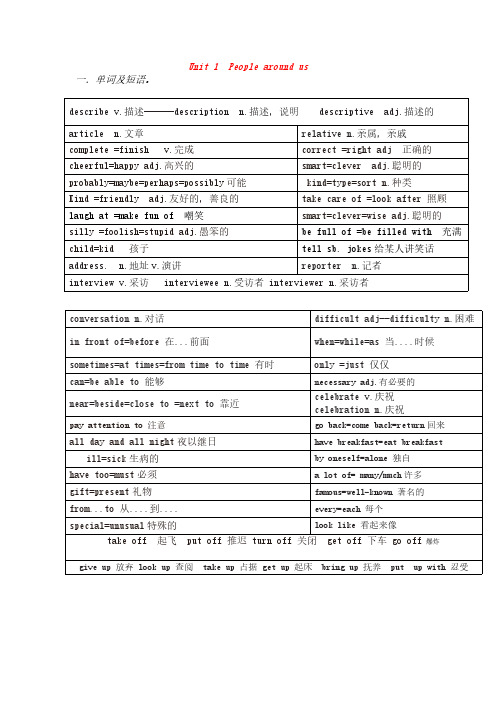
Unit1People around us一.单词及短语。
describe v.描述———description n.描述,说明descriptive adj.描述的article n.文章relative n.亲属,亲戚complete=finish v.完成correct=right adj正确的cheerful=happy adj.高兴的smart=clever adj.聪明的probably=maybe=perhaps=possibly可能kind=type=sort n.种类Kind=friendly adj.友好的,善良的take care of=look after照顾laugh at=make fun of嘲笑smart=clever=wise adj.聪明的silly=foolish=stupid adj.愚笨的be full of=be filled with充满child=kid孩子tell sb.jokes给某人讲笑话address.n.地址v.演讲reporter n.记者interview v.采访interviewee n.受访者interviewer n.采访者conversation n.对话difficult adj--difficulty n.困难in front of=before在...前面when=while=as当....时候sometimes=at times=from time to time有时only=just仅仅can=be able to能够necessary adj.有必要的near=beside=close to=next to靠近celebrate v.庆祝celebration n.庆祝pay attention to注意go back=come back=return回来all day and all night夜以继日have breakfast=eat breakfast ill=sick生病的by oneself=alone独自have too=must必须a lot of=many/much许多gift=present礼物famous=well-known著名的from...to从....到....every=each每个special=unusual特殊的look like看起来像take off起飞put off推迟turn off关闭get off下车go off爆炸give up放弃look up查阅take up占据get up起床bring up抚养put up with忍受一.阅读1.People around you.(p1)1“people”表示“人”时,是集体名词,可理解为“人们”,词尾不能加“s”,且不能表示单个人,可以说“some people,many people”,但不可以说“a people,one people”.但是,people表示“民族”时,有单复数之分。
牛津沪教版英语七年级下重点知识复习
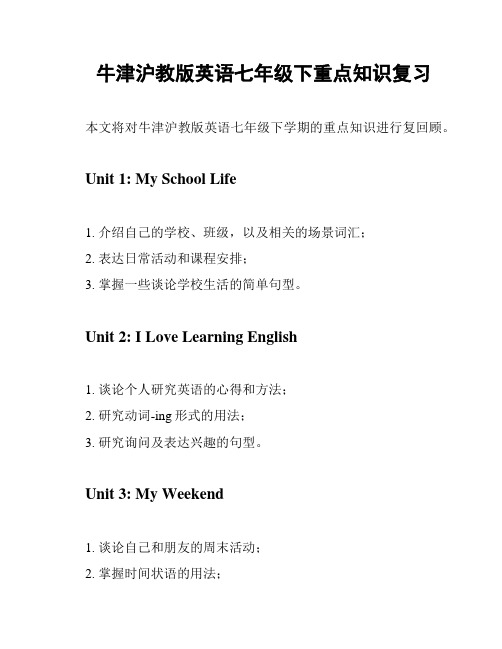
牛津沪教版英语七年级下重点知识复习
本文将对牛津沪教版英语七年级下学期的重点知识进行复回顾。
Unit 1: My School Life
1. 介绍自己的学校、班级,以及相关的场景词汇;
2. 表达日常活动和课程安排;
3. 掌握一些谈论学校生活的简单句型。
Unit 2: I Love Learning English
1. 谈论个人研究英语的心得和方法;
2. 研究动词-ing形式的用法;
3. 研究询问及表达兴趣的句型。
Unit 3: My Weekend
1. 谈论自己和朋友的周末活动;
2. 掌握时间状语的用法;
3. 掌握一些听力技巧。
Unit 4: Jobs
1. 研究表示职业的词汇;
2. 表达及询问个人志愿和理想。
Unit 5: Food and Drink
1. 研究食物和饮品的词汇;
2. 掌握询问及表述食物喜好和不喜好的方法。
Unit 6: Sports and Hobbies
1. 研究表示不同体育项目和爱好的单词;
2. 表达及询问个人感受和喜好。
Unit 7: Travelling
1. 谈论旅游的相关话题;
2. 表达和询问喜欢或不喜欢旅游的理由和偏好。
Unit 8: Festivals and Celebrations
1. 研究表示节日和庆祝活动的单词;
2. 谈论家庭或朋友间的庆祝活动。
总结
以上是牛津沪教版英语七年级下学期的重点知识复习,希望对大家的英语学习有所帮助。
沪教版英语七年级下册知识点归纳

沪教版英语七年级下册知识点归纳一、语法知识点。
1. 一般现在时。
- 概念:表示经常发生的动作或存在的状态。
- 结构:- 主语是第三人称单数(he/she/it等)时,动词要用第三人称单数形式(一般在动词原形后加 -s或 -es)。
例如:He likes reading books.- 主语不是第三人称单数时,动词用原形。
例如:I play football every day.- 时间状语:often, usually, always, sometimes, every day/week/month 等。
2. 现在进行时。
- 概念:表示现在正在进行的动作或存在的状态。
- 结构:be动词(am/is/are)+动词的 -ing形式。
例如:She is singing a song.- 时间状语:now, at the moment等。
- 动词 -ing形式的构成:- 一般在动词原形后加 -ing,如:play - playing。
- 以不发音的e结尾的动词,去掉e再加 -ing,如:write - writing。
- 以重读闭音节结尾且末尾只有一个辅音字母的动词,双写这个辅音字母再加 -ing,如:run - running。
3. 形容词的比较级和最高级。
- 比较级:- 构成:- 一般在形容词原级后加 -er,如:tall - taller。
- 以e结尾的形容词,加 -r,如:nice - nicer。
- 以重读闭音节结尾且末尾只有一个辅音字母的形容词,双写这个辅音字母再加-er,如:big - bigger。
- 多音节形容词和部分双音节形容词,在原级前加more,如:beautiful - more beautiful。
- 用法:用于两者之间的比较,常用结构为“A+be+比较级+than + B”,例如:This book is more interesting than that one.- 最高级:- 构成:- 一般在形容词原级后加 -est,如:tall - tallest。
初中英语七年级下册(U1-2)专题复习及答案
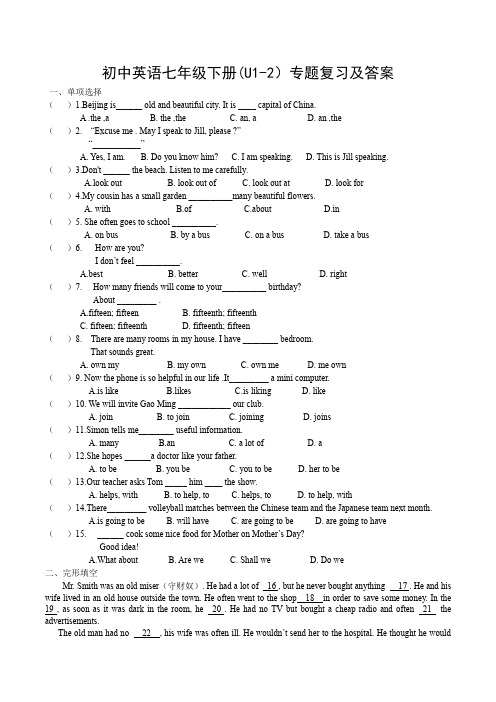
初中英语七年级下册(U1-2)专题复习及答案一、单项选择()1.Beijing is______ old and beautiful city. It is ____ capital of China.A .the ,a B. the ,the C. an, a D. an ,the()2.---“Excuse me . May I speak to Jill, please ?”---“___________”A. Yes, I am.B. Do you know him?C. I am speaking.D. This is Jill speaking.()3.Don't ______ the beach. Listen to me carefully.A.look outB. look out ofC. look out atD. look for()4.My cousin has a small garden __________many beautiful flowers.A. withB.ofC.aboutD.in()5. She often goes to school __________.A. on busB. by a busC. on a busD. take a bus()6. --- How are you?--- I don’t feel __________.A.bestB. betterC. wellD. right()7. ---How many friends will come to your__________ birthday?---About _________ .A.fifteen; fifteenB. fifteenth; fifteenthC. fifteen; fifteenthD. fifteenth; fifteen()8.---There are many rooms in my house. I have ________ bedroom.--- That sounds great.A. own myB. my ownC. own meD. me own()9. Now the phone is so helpful in our life .It_________ a mini computer.A.is likeB.likesC.is likingD. like()10. We will invite Gao Ming ____________ our club.A. joinB. to joinC. joiningD. joins()11.Simon tells me________ useful information.A. manyB.anC. a lot ofD. a()12.She hopes ______a doctor like your father.A. to beB. you beC. you to beD. her to be()13.Our teacher asks Tom _____ him ____ the show.A. helps, withB. to help, toC. helps, toD. to help, with()14.There_________ volleyball matches between the Chinese team and the Japanese team next month.A.is going to beB. will haveC. are going to beD. are going to have()15.--- ______ cook some nice food for Mother on Mother’s Day?--- Good idea!A.What aboutB. Are weC. Shall weD. Do we二、完形填空Mr. Smith was an old miser(守财奴). He had a lot of 16 , but he never bought anything 17 . He and his wife lived in an old house outside the town. He often went to the shop 18 in order to save some money. In the 19 , as soon as it was dark in the room, he 20 . He had no TV but bought a cheap radio and often 21 the advertisements.The old man had no 22 , his wife was often ill. He wouldn’t send her to the hospital. He thought he would23 much to the doctors if they looked her over. He bought a few medical books and bought some 24 for her.One night, Mrs. Smith felt unwell. She had got a bad headache. She asked her husband to __25 a doctor, but he didn’t agree. He brought out some pills and made her 26 them. But it was no use.The old woman began to 27 at home. He looked at the door and went in another room and __ 28 there. The next morning, when he woke up, he came into her 29 to see if she was all right. But he found the poor woman had died. He hurried to the telephone, but 30 his mind at once. He ran out and shouted to the servant(佣人), “Don’t cook breakfast for Mrs. Smith this morning, Linda!”( )16. A. books B. money C. clothes D. shoes( )17. A. bad B. well C. expensive D. cheap( )18. A. on foot B. by car C. by taxi D. by bus( )19. A. day B. morning C. afternoon D. evening( )20. A. went to bed B. went to the cinema C. read newspapers D. went to dance( )21. A. listened to B. watched C. mended D. looked at( )22. A. brothers B. sisters C. uncles D. children( )23. A. pass B. tell C. pay D. sell( )24. A. food B. medicine C. fruit D. vegetables( )25. A. look after B. take care of C. catch up with D. send for( )26. A. take B. drink C. to take D. to drink( )27. A. laugh B. sing C. cry D. dance( )28. A. slept B. played C. worked D. drank( )29. A. workplace B. bedroom C. library D. office( )30. A. kept B. finished C. changed D. forgot三、阅读理解AMr. White’s office was far away from his house, and every day he went to work by bus and came home in the same way. It was half past five in the afternoon and Mr. White left his office. On his way to the bus stop, he bought a newspaper. There were a lot of people waiting at the bus stop, because most people finished work at the same time in that town.A few minutes later, a bus came and Mr. White got on with other passengers. Mr. White was lucky to find an empty seat in the front of the bus. He sat down and opened his newspaper to read. After a few more bus stops, a woman got on the bus, but there were no more empty seats on the bus, so she came and stood right in front of Mr. White. She looked old and was carrying a big basket. Mr. White was reading his newspaper and didn’t see her, but a few seconds after the woman stood in front of him, he looked up and put his newspaper in his pocket. He tried to stand up, but the woman pushed him back into his seat quickly.After a few minutes, Mr. White tried to stand up again, but again the woman pushed him back into his seat. “Please don’t stand up. I don’t want a man to give a seat to me on a bus. I’m strong enough,”said the woman.Mr. White looked at her angrily and said, “This time, I'm really going to stand up, Madam. You’ve made me miss two stops.”( )31.Mr. White came home_________.A.by trainB.by busC.by airD.on foot( )32.Mr. White was lucky because_________.A.a bus came soon after he got to the bus stopB.he could get on the busC.other people gave him a seatD.he found a seat himself( )33.The woman stood in front of Mr. White because__________.A.she knew himB.she liked himC.she wanted him to give the seat to herD.she happened to stand there( )34.How many stops did Mr. White miss?A.1.B.2.C.3.D.4.( )35.Which of the following is true?A.The woman didn’t let Mr. White get off the bus.B.The woman didn’t need a seat.C.The woman didn’t want any man to give her seat on a bus.D.The woman didn’t let Mr. White read the newspaper.BA man made a nice talking machine. It could weigh people’s weight. The man wanted to try the machine before he could make a lot of them. He put the machine into the waiting room of a station. There were always a lot of people in and out.The first one who used the machine was an Indian woman. She stood on the machine. The machine thought for a few seconds to decide which language to speak.“Good morning, Madam,” it said in Indian. “Your weight is 72 kilos. That’s three kilos more. If you eat more fruit and vegetables, you’ll soon be all right. Please have a nice day.”The second one to use the machine was a Chinese girl. She stood on the machine and waited to hear her weight.“Good morning, Miss,” The machine said in Chinese. “Your weight is 45 kilos. It’s all right for your age and height. Go on to eat what you eat every day. Please have a nice day.”The third one to use the machine was an American woman. She thought for a long time to stand on the machine. The machine spoke quickly in English, “Good morning, will one of you get off?”( )36. The machine in the passage could ___________.A. weigh and talk to peopleB. tell people what they should eatC. speak all kinds of languagesD. make people laugh( )37. The man put his first machine_____________.A. in the stationB. in a trainC. in the doctor's waiting roomD. in the women's room.( )38. What did the machine tell the Indian woman?A. She was a little lighter.B. She was a little heavier.C. It couldn’t speak Indian.D. To eat what she wanted to eat.( )39. The machine said to a Chinese girl that ______________.A. She should eat moreB. she should eat lessC. She had to eat more fruitD. she kept herself healthy( )40. How was the American woman?A. She was healthy.B. She liked thinking.C. She was too heavy.D. The machine didn’t like her.四、词汇A. 请根据括号中的中文提示、英文释义或句意,写出句中所缺单词,使句子通顺。
(word完整版)牛津沪教版英语七年级下期末重点知识复习总结,推荐文档
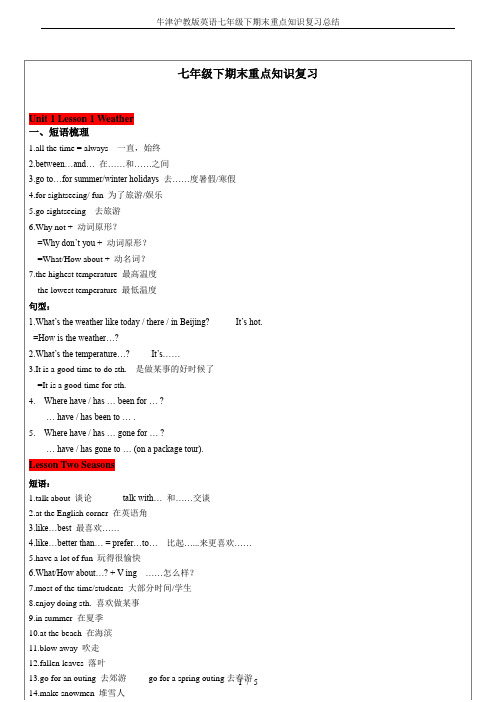
a(one) third 或one-third三分之一three-fifths五分之三a(one) half二分之一a(one) quarter或one-fourth四分之一three quarters或three-fourths四分之三回答型阅读解题技巧一、专题知识梳理知识点1:回答问题的题型、考点和分值1. 题型:一般疑问句,选择疑问句,反义疑问句,特殊疑问句,主观题2. 考点:对各种疑问句的回答方式及语法的考查(如:时态,主谓一致等)1)一般疑问句的回答:yes or no来回答2)选择疑问句的回答:选择其中的一个或者neither或者both来回答3)反义疑问句的回答:根据事实来回答4)特殊疑问句的回答:why—because/because of, how—by/through doing, how long—for+时间段/since+时间点, when和where提问,介词不能够少,how many或者how far提问时,注意限定词only/more than/ at least/about等5)主观题,注意不能用I think it is interesting或者I think it is good来回答,一定要发表自己的观点和原因。
3. 分值:共12分知识点2:回答问题的技巧1.细节题细节题目比较简单,一般从文中可以直接找到答案,直接抄下来就可以2.归纳总结归纳总结类的题目相对较难,基础好的学生还可以,基础较薄弱的学生一般会抄原文或者自己总结的,但是会出现各种各样的错误二、专题精讲D. Answer the question. (根据短文内容,回答下面问题,12分)It's March, 2050.Frank and Mary Smith wake up in their comfortable house in the morning and switch on the bedroom computer to get the latest news. They used to read the Times, but changed to electronic newspapers many years ago.There is the usual news about space: another space flight has returned from Mars and scientistshave discovered a new planet. Then they turn to business news: the US dollar has risen greatly inShanghai, one of the world's leading business centers. Mary tells the computer to buy 5,000 dollars, andthere is a quick response that it has been done.As they watch the screen, Mary orders one of the household robots to make coffee for them.Frank disappears into the study to join a video conference with his partners aroundthe world. He is a computer engineer, working for several companies. This is histhird job: he used to be in marketing and then television.Mary has a quick look at the shopping channels - the usual selection of electric cars, household robots and cheap travel offers - before picking up the video phone to talk to her assistant. She also hasa job and she is doing medical research. Both she and Frank used to have an office desk in London, butin 2014 they decided to move to the seaside and work from home.Frank and Mary have one daughter, Louise, who also has her own workstation at home. She goes to school only one day a week, mainly to play with other students. Classrooms disappeared in 2030 because there was no longer any need for them: communications systems have made it much easier to learn at home.Louise, now thirteen, is studying Chinese at present, which has become a world language as important as English. Louise has many Chinese friends. They communicate by computer.According to the family doctor, Louise will live to at least 130. Her wish is to work for a few decades (十年) and then spend her time on music and painting.3. Many people didn’t believe Sir Francis Bacon, did they?______________________________________________________.4.Who proved that Sir Francis Bacon was right?_______________________________________________________.5.What do you think of Sir Francis Bacon?______________________________________________________________.(2)Library Rules for TeenagersWe want you to remember these rules for our city libraries.◆Always remember to take your library card with you when you visit the library. If you don’thave your library card, we won’t let you in.◆Your library card is for your use only. If you lend it to others, you will still be responsiblefor (对……负责任) the books on the card.◆If you lose your library card, you can get a new one for free with your ID card.◆Take good care of what you borrow. If you lose it, you will have to pay for it.◆You can keep the books for up to 31 days. Remember to return the books on time.◆Tell us your e-mail address and we will remind (提醒) you when you need to return the books.◆If what you want to borrow has been borrowed by others, you can send us an e-mail. We will keep the book for youwhen it is returned. When it is your turn, we will tell you.Read and answer the following questions(阅读短文并回答问题):80. Who are these rules for?_______________________________________81. Can we lend our own library card to others for use?_______________________________________82. What can you do if you lose your library card?_______________________________________83. What will happen if you borrow a book from the library and lose it?_______________________________________84. How long can you keep a book?_______________________________________85. Why does the library need readers’ e-mail address?_______________________________________。
(word完整版)牛津沪教版英语七年级下期末重点知识复习总结,推荐文档.docx
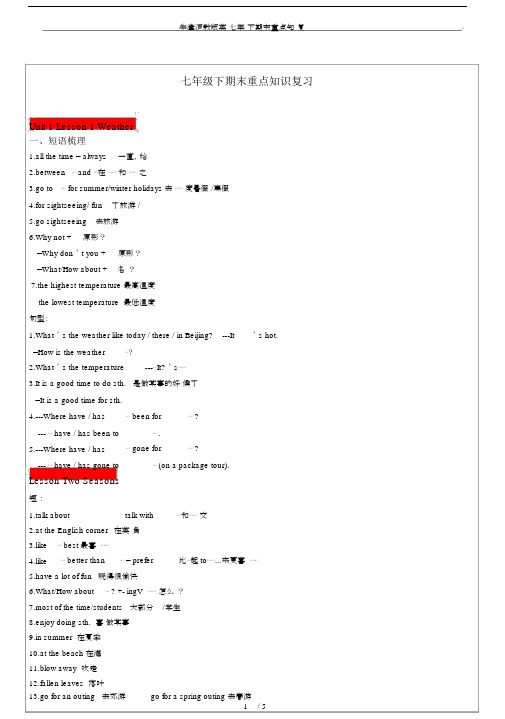
牛津沪教版英七年下期末重点知复七年级下期末重点知识复习Unit 1 Lesson 1 Weather一、短语梳理1.all the time = always一直,始2.between⋯and⋯在⋯⋯ 和⋯⋯ 之3.go to⋯for summer/winter holidays去⋯⋯ 度暑假/寒假4.for sightseeing/ fun了旅游/5.go sightseeing去旅游6.Why not +原形?=Why don ’ t you +原形?=What/How about +名?7.the highest temperature 最高温度the lowest temperature 最低温度句型:1.What ’ s the weather like today / there / in Beijing? ---It’ s hot.=How is the weather⋯?2.What ’ s the temperature---⋯It? ’ s⋯⋯3.It is a good time to do sth. 是做某事的好候了=It is a good time for sth.4.---Where have / has⋯ been for⋯ ?--- ⋯ have / has been to⋯ .5.---Where have / has⋯ gone for⋯ ?--- ⋯ have / has gone to⋯ (on a package tour).Lesson Two Seasons短:1.talk about talk with⋯和⋯⋯交2.at the English corner在英角3.like⋯ best最喜⋯⋯4.like⋯ better than⋯ = prefer比⋯起to⋯⋯...来更喜⋯⋯5.have a lot of fun玩得很愉快6.What/How about⋯ ? +- ingV⋯⋯怎么?7.most of the time/students大部分 /学生8.enjoy doing sth. 喜做某事9.in summer 在夏季10.at the beach 在海11.blow away 吹走12.fallen leaves 落叶14.make snowmen 堆雪人牛津沪教版英七年下期末重点知复法:so 和 neither 引的倒装句1、 So 同,也一So 后面接 be,have, has, do, does, did 或情,然后接主,其的与上文一致,人称与主一致。
上海教育出版社英语七年级下册感叹句讲解
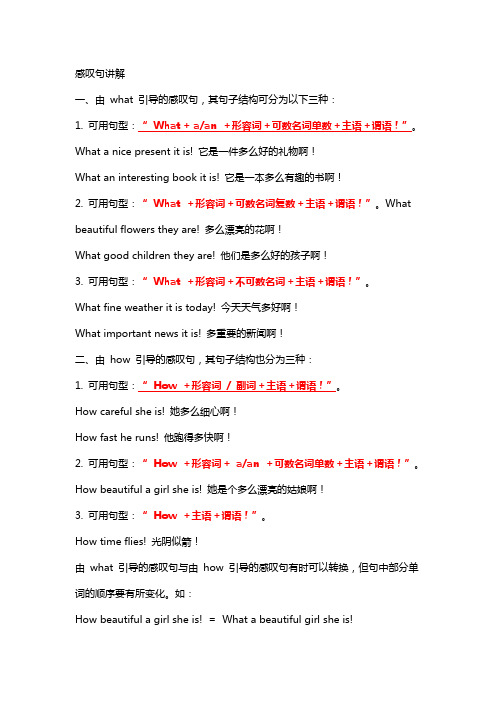
感叹句讲解一、由what 引导的感叹句,其句子结构可分为以下三种:1. 可用句型:“What + a/an +形容词+可数名词单数+主语+谓语!”。
What a nice present it is! 它是一件多么好的礼物啊!What an interesting book it is! 它是一本多么有趣的书啊!2. 可用句型:“What +形容词+可数名词复数+主语+谓语!”。
What beautiful flowers they are! 多么漂亮的花啊!What good children they are! 他们是多么好的孩子啊!3. 可用句型:“What +形容词+不可数名词+主语+谓语!”。
What fine weather it is today! 今天天气多好啊!What important news it is! 多重要的新闻啊!二、由how 引导的感叹句,其句子结构也分为三种:1. 可用句型:“How +形容词/ 副词+主语+谓语!”。
How careful she is! 她多么细心啊!How fast he runs! 他跑得多快啊!2. 可用句型:“How +形容词+a/an +可数名词单数+主语+谓语!”。
How beautiful a girl she is! 她是个多么漂亮的姑娘啊!3. 可用句型:“How +主语+谓语!”。
How time flies! 光阴似箭!由what 引导的感叹句与由how 引导的感叹句有时可以转换,但句中部分单词的顺序要有所变化。
如:How beautiful a girl she is! =What a beautiful girl she is!What delicious cakes these are! =How delicious these cakes are!三、有时感叹句也可以由一个单词、词组、祈使句、陈述句等构成。
如:Good idea! (好主意!)wonderful! (太精彩了!)Thank goodness! (谢天谢地!)how 本身是疑问词,意思是“如何,怎样”。
完整版沪教版七年级英语下册总结材料
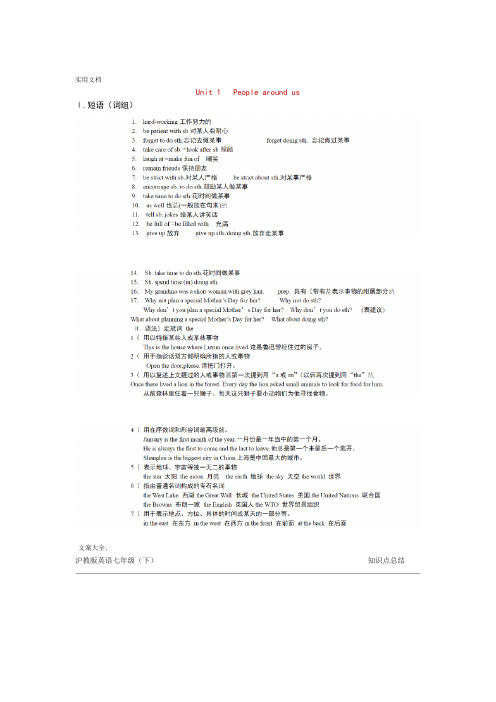
实用文档
Unit 1 People around us
Ⅰ.短语(词组)
文案大全.
沪教版英语七年级(下)知识点总结
2
知识点总结沪教版英语七年级(下)
16.
3
沪教版英语七年级(下)知识点总结
Unit 3 our animals friends
&词组短语Ⅰ.
4
沪教版英语七年级(下)知识点总结
5
沪教版英语七年级(下)知识点总结
6
沪教版英语七年级(下)知识点总结
7
沪教版英语七年级(下)知识点总结
8
沪教版英语七年级(下)知识点总结
9
沪教版英语七年级(下)知识点总结
01.
沪教版英语七年级(下)知识点总结
11.
沪教版英语七年级(下)知识点总结
Unit 7 poems
21.
沪教版英语七年级(下)知识点总结
31.
沪教版英语七年级(下)知识点总结
Ⅱ.语法 when 引导的时间状语从句。
一、
41.
沪教版英语七年级(下)知识点总结
51.。
牛津上海版七年级下英语常用语法知识——感叹句知识点

一、选择题1.—Tony, it's time ________ dinner.—I'm coming, dad.A.have B.to have C.had D.having B解析:B【解析】【分析】【详解】句意:——托尼,到了吃晚饭时间了。
——爸爸,我来了。
考查固定句式。
have dinner吃晚餐。
have动词原形;to have不定式;had一般过去时;having现在分词。
根据固定搭配“到了做某事的时候了it’s time to do sth.”,故选B。
2.—You don’t know what great difficulty I had ________ to get the two tickets.—But the film is really worth _________ twice.A.managing; seeing B.to manage; seeingC.managing; being seen D.managed; to see A解析:A【解析】【分析】【详解】试题分析: 句意:---你不知道我试图得到两张票有多大的困难。
---但是电影值得看两遍。
此题考查固定短语have difficulty doing sth 做某事有困难,be worth doing事值得做;根据句意,故选A。
3.Our parents won't allow us _____ in the river alone.A.swimB.to swimC.swimmingD.swam B解析:B【解析】句意:我们的父母不允许我们单独去河里游泳。
A. swim动词原形;B. to swim动词不定式;C. swimming分词形式;D. swam过去式。
Allow sb to do sth允许某人做某事。
故答案选B。
点睛:接动词不定式作宾语补足语的常见动词:advise. 建议;allow 允许;ask 请(叫);encourage.鼓励;expect 期望;help. 帮助;invite. 邀请; like 喜欢;need需要;order命令;prefer. 宁愿teach .教;tell 告诉;want. 想;warn. 警告;wish希望等。
人教版英语七年级下册 Unit1-Unit2知识点清单

Unit1Can you play the guitar?1. English club 英语俱乐部2. art club 艺术俱乐部3. volleyball club 排球俱乐部4. chess club 棋类俱乐部5. swimming club 游泳俱乐部6. music club 音乐俱乐部7. in the music room 在音乐室8. school show 学校公演9. play sth on + 乐器“用某种乐器演奏”10. join sb ...和某人一起做某事11. be good with 相处得好e and join us 快来应聘13. help sb with wth / help sb (to )do sth 帮助某人做某事14. do Chinese Kungfu 玩中国功夫15. What club do you want to join? 你想参加什么俱乐部?I want to join the swimming club. 我想参加游泳俱乐部。
16. What club does he /she want to join?17. He(She) wants to join the music club.18. show sb sth /show sth to sb 给某人看某物。
19. 情态动词can +动词原形(无人称变化)肯定句:He can play soccer.否定句:He can not (can’t) play soccer.疑问句:(请注意否定回答)Can he play soccer? Yes, he can. No, he can’t.Unit2What time do you go to school?1. get up 起床2. do homework 做作业3. do one’s homework 做作业4. eat breakfast 吃早饭5. eat lunch 吃午饭6. eat dinner 吃晚饭7. take a shower / have a shower 洗澡8. get to +地名名词“到达……9. get here 到达这儿10 get there 到达那儿11. get home 到达家12. listen to sb 听……讲(说)13. work long hours 长时间工作14. study long hours 长时间学习15. brush one’s teeth 刷牙16. by bus = on a (the )bus 乘公共汽车17. take a bus to +地点名词/go to+地点名词/by bus 乘公共汽车去某地18. begin to do wth /start to do sth 开始做某事19. write to sb 给某人写信20. know about 了解有关……21. know a lot about 对…… 了解得多22.tell sb about sth 把有关… 告诉某人23. be late for school 上学迟到.24 hope to do sth. 希望做某事25be late for class 上课迟到26. wish sb to do sth. 希望某人做某事27.What time is it ?/ What’s the tim e? 几点了?28. School starts at nine o’clock. /classes begin at nine o’clock.学校9点开始上课29. Best wishes to you 向你致以美好的祝愿30. Best wishes for Teachers’ Day 祝教师节快乐31.①整点的表达法:7:00 seven o’clock 2: 00 two o’clock②30分钟之内的表达法:2:05 two five five past two 3:10 three ten ten past three6:15 six fifteen a quarter past six 7:25 seven twenty-five twenty-five past seven8:30 eight thirty half past eight③30分钟之后3:55 three fifty –five five to five 7: 40 seven forty twenty to eight8: 35 eight thirty-five twenty-five to nine 9:45 nine forty- five a quarter to ten“at in on”①at: at seven o’clock at a quarter past five at half past six② In:in 2006 in December in winterin the morning in the afternoon in the evening③ On:on Monday on Sunday afternoon on Monday morningon November 1st on the morning of June 2nd表示现在一段时间内经常性或习惯性的动作,标志词:usually, often, always, sometimes, every 等。
沪教版英语七年级下册Unit1复习课件

10. How I wish to be a ________ of the Super Stars Band! member
1. 努力学习 2. 花时间去做某事 3. 一位满头银发的矮个 子女士 4. 也,还有 5. 照料,照顾 6. 最好的朋友 7. 给某人讲笑话
1. study hard 2. take time to do sth. 3. a short woman with grey
12. laugh (v.大笑) We all laughed after hearing her joke. -- laughter (n. 笑声) laugh at sb. 嘲笑… 13. remain (vi.保持;继续;仍然处于 ) She remained calm after the accident. We’ll remain friends forever. I remained six days in London. 逗留
~ well-dressed; fashionable What a smart dress!
6. probably (adv. 很可能) ~ possibly ~ maybe (口头常用)
We’re probably returning home tomorrow. 7. forget (-forgot-forgotten) 忘记
a) His fashion show was ______s_u__c_c_e.ssful
b) She __s_u__c_c_e_e_d_eadt last. c) Failure is the mother of_______s_ess d) We ___s_u_c_c_e_s_s_f_u_ll_y__ drove back to the centre of the city
沪教版英语七年级下册知识点归纳
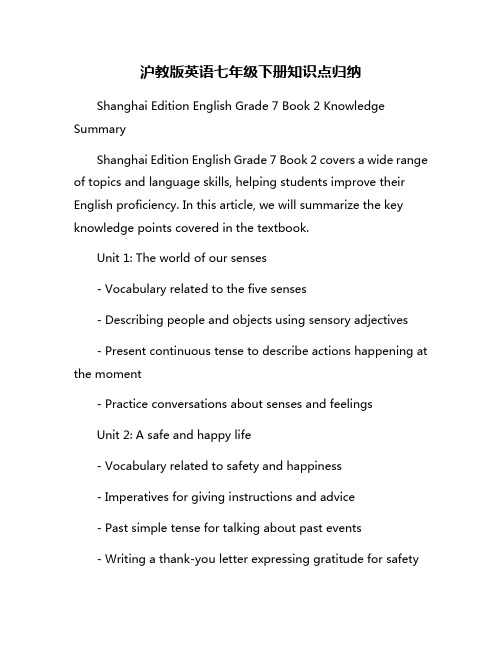
沪教版英语七年级下册知识点归纳Shanghai Edition English Grade 7 Book 2 Knowledge SummaryShanghai Edition English Grade 7 Book 2 covers a wide range of topics and language skills, helping students improve their English proficiency. In this article, we will summarize the key knowledge points covered in the textbook.Unit 1: The world of our senses- Vocabulary related to the five senses- Describing people and objects using sensory adjectives- Present continuous tense to describe actions happening at the moment- Practice conversations about senses and feelingsUnit 2: A safe and happy life- Vocabulary related to safety and happiness- Imperatives for giving instructions and advice- Past simple tense for talking about past events- Writing a thank-you letter expressing gratitude for safetyUnit 3: Getting around- Vocabulary related to traveling and transportation- Asking for and giving directions using prepositions and landmarks- Present simple tense for talking about habits and routines- Role-playing conversations at the travel agency and on the streetUnit 4: Growing up- Vocabulary related to growing up and milestones in life- Using comparatives and superlatives to compare people and things- Future simple tense for making predictions and plans- Describing ambitions and future career goalsUnit 5: Sharing the planet- Vocabulary related to environmental issues and conservation- Modal verbs for expressing obligation and possibility- Present perfect tense for talking about experiences and actions connected to the present- Group discussions on environmental topics and solutionsUnit 6: At work- Vocabulary related to jobs and professions- Using conditional sentences to express hypothetical situations- Using phrasal verbs and collocations in job interviews- Writing a CV and cover letter for a job applicationUnit 7: Cultural heritage- Vocabulary related to cultural traditions and customs- Using reported speech to convey information and opinions- Active and passive voice for presenting and discussing cultural practices- Researching and presenting on cultural heritage and preservationUnit 8: Good health- Vocabulary related to health and well-being- Modal verbs for giving advice and suggestions- Present perfect continuous tense for talking about activities that started in the past and continue to the present- Dialogues on healthy lifestyles and routinesUnit 9: Friends and family- Vocabulary related to relationships and emotions- Using indirect questions and polite requests in social situations- Gerunds and infinitives for expressing preferences and intentions- Role-playing family gatherings and friendly conversationsUnit 10: Life in the future- Vocabulary related to technology and innovation- Modal verbs for future predictions and possibilities- Review of verb tenses and sentence structures covered in previous units- Writing a short essay on the future of technology and its impact on societyOverall, Shanghai Edition English Grade 7 Book 2 provides a comprehensive language learning experience, encompassing all four language skills – listening, speaking, reading, and writing. By mastering the key knowledge points summarized in this article, students can enhance their English proficiency and communication abilities.。
最新沪教版英语七年级下册知识点总结
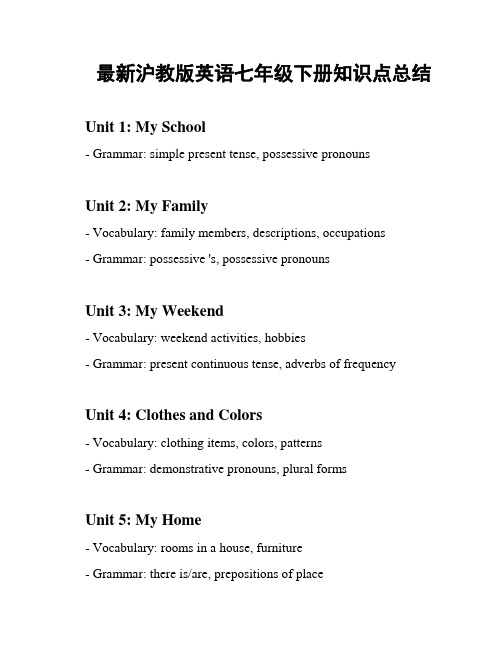
最新沪教版英语七年级下册知识点总结Unit 1: My School- Grammar: simple present tense, possessive pronounsUnit 2: My Family- Vocabulary: family members, descriptions, occupations- Grammar: possessive 's, possessive pronounsUnit 3: My Weekend- Vocabulary: weekend activities, hobbies- Grammar: present continuous tense, adverbs of frequencyUnit 4: Clothes and Colors- Vocabulary: clothing items, colors, patterns- Grammar: demonstrative pronouns, plural formsUnit 5: My Home- Vocabulary: rooms in a house, furniture- Grammar: there is/are, prepositions of placeUnit 6: Food and Drinks- Vocabulary: food items, drinks, meals- Grammar: countable and uncountable nouns, some/anyUnit 7: Sports and Hobbies- Vocabulary: sports, hobbies- Grammar: simple past tense, regular verbs, irregular verbsUnit 8: Daily Routines- Vocabulary: daily activities, time expressions- Grammar: present simple tense, adverbial phrasesUnit 9: At the Park- Vocabulary: park facilities, natureUnit 10: My Body- Vocabulary: body parts, health problems- Grammar: can/can't, should/shouldn't该文档总结了最新沪教版英语七年级下册的知识点。
初中英语七年级下册感叹句重要知识点整理汇总
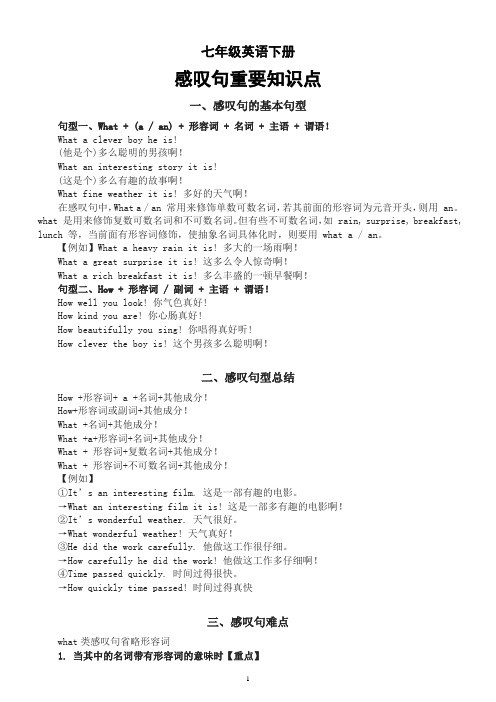
七年级英语下册感叹句重要知识点一、感叹句的基本句型句型一、What + (a / an) + 形容词 + 名词 + 主语 + 谓语!What a clever boy he is!(他是个)多么聪明的男孩啊!What an interesting story it is!(这是个)多么有趣的故事啊!What fine weather it is! 多好的天气啊!在感叹句中,What a / an 常用来修饰单数可数名词,若其前面的形容词为元音开头,则用 an。
what 是用来修饰复数可数名词和不可数名词。
但有些不可数名词,如 rain, surprise, breakfast, lunch 等,当前面有形容词修饰,使抽象名词具体化时,则要用 what a / an。
【例如】What a heavy rain it is! 多大的一场雨啊!What a great surprise it is! 这多么令人惊奇啊!What a rich breakfast it is! 多么丰盛的一顿早餐啊!句型二、How + 形容词 / 副词 + 主语 + 谓语!How well you look! 你气色真好!How kind you are! 你心肠真好!How beautifully you sing! 你唱得真好听!How clever the boy is! 这个男孩多么聪明啊!二、感叹句型总结How +形容词+ a +名词+其他成分!How+形容词或副词+其他成分!What +名词+其他成分!What +a+形容词+名词+其他成分!What + 形容词+复数名词+其他成分!What + 形容词+不可数名词+其他成分!【例如】①It’s an interesting film. 这是一部有趣的电影。
→What an interesting film it is! 这是一部多有趣的电影啊!②It’s wonderful weather. 天气很好。
泸教版英语七下U1知识点笔记
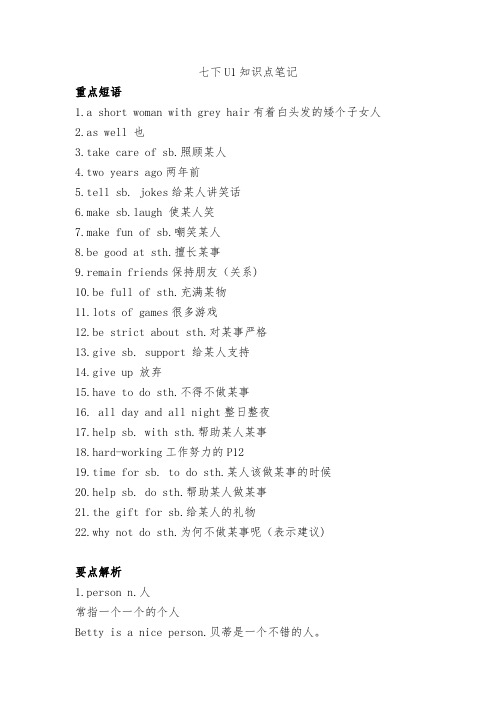
七下U1知识点笔记重点短语1.a short woman with grey hair有着白头发的矮个子女人2.as well 也3.take care of sb.照顾某人4.two years ago两年前5.tell sb. jokes给某人讲笑话6.make ugh 使某人笑7.make fun of sb.嘲笑某人8.be good at sth.擅长某事9.remain friends保持朋友(关系)10.be full of sth.充满某物11.lots of games很多游戏12.be strict about sth.对某事严格13.give sb. support 给某人支持14.give up 放弃15.have to do sth.不得不做某事16. all day and all night整日整夜17.help sb. with sth.帮助某人某事18.hard-working工作努力的P1219.time for sb. to do sth.某人该做某事的时候20.help sb. do sth.帮助某人做某事21.the gift for sb.给某人的礼物22.why not do sth.为何不做某事呢(表示建议)要点解析1.person n.人常指一个一个的个人Betty is a nice person.贝蒂是一个不错的人。
■表示多个人时,不能用persons,要用people。
There are many persons in the park.(×)There are many people in the park.(V)公园里有很多人。
2.cheerful adj.快乐的、高兴的、兴高采烈的■表示人感到高兴She had a cheerful smile on her face.她的脸上挂着高兴的笑容。
可表示事物地方等令人感到高兴和愉悦。
七年级下沪教版英语u1知识点
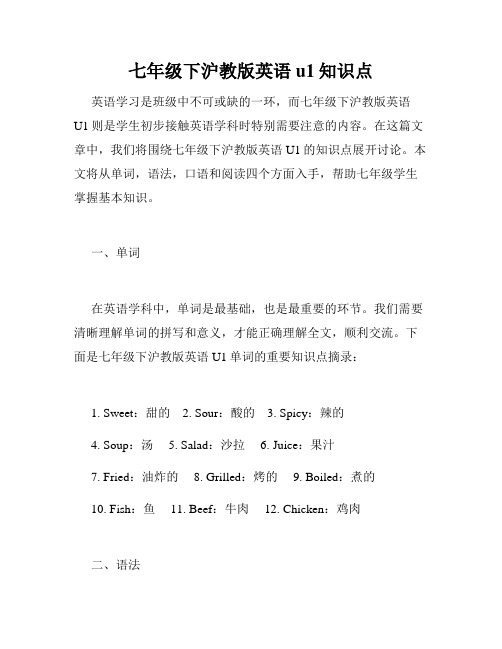
七年级下沪教版英语u1知识点英语学习是班级中不可或缺的一环,而七年级下沪教版英语U1则是学生初步接触英语学科时特别需要注意的内容。
在这篇文章中,我们将围绕七年级下沪教版英语U1的知识点展开讨论。
本文将从单词,语法,口语和阅读四个方面入手,帮助七年级学生掌握基本知识。
一、单词在英语学科中,单词是最基础,也是最重要的环节。
我们需要清晰理解单词的拼写和意义,才能正确理解全文,顺利交流。
下面是七年级下沪教版英语U1单词的重要知识点摘录:1. Sweet:甜的2. Sour:酸的3. Spicy:辣的4. Soup:汤5. Salad:沙拉6. Juice:果汁7. Fried:油炸的 8. Grilled:烤的 9. Boiled:煮的10. Fish:鱼 11. Beef:牛肉 12. Chicken:鸡肉二、语法语法是英语学科中的重中之重,也是英文写作和口语表达的基础。
下面是七年级下沪教版英语U1语法的核心知识点:1. 动词be的基本用法“am,is,are”是动词be的基本形式,它们可以作为主语,表示存在状态。
2. 动词的时态时态是英语句子中最重要的语法部分之一。
在七年级下沪教版英语U1中,需要学生掌握最基本的时态构成,包括现在时,过去时和将来时。
三、口语口语是英语学科中十分重要的部分,它与写作或其他部分相比,更能够验证英语真正的交流效果。
在七年级下沪教版英语U1中,我们需要学会能够常用的口语表达方式,例如:1. 正确发音在口语方面,发音是最重要的部分之一。
学生需要清晰发音,正确运用语调。
2. 简单交流学生需要学会熟练运用英语口语表达简单交流内容,例如问候,介绍自己等等。
四、阅读阅读是英语学科中重要的部分之一,它可以帮助学生更好地理解英语,更深入地了解英语国家和西方文化。
在七年级下沪教版英语U1中,学生需要通过阅读文章和小说来掌握下列知识:1. 阅读理解阅读理解是英语学科中较难掌握的一个方面。
学生需要通过阅读获得正确的理解,掌握文章内容。
2021沪津版七年级英语下册U1-2期中复习资料
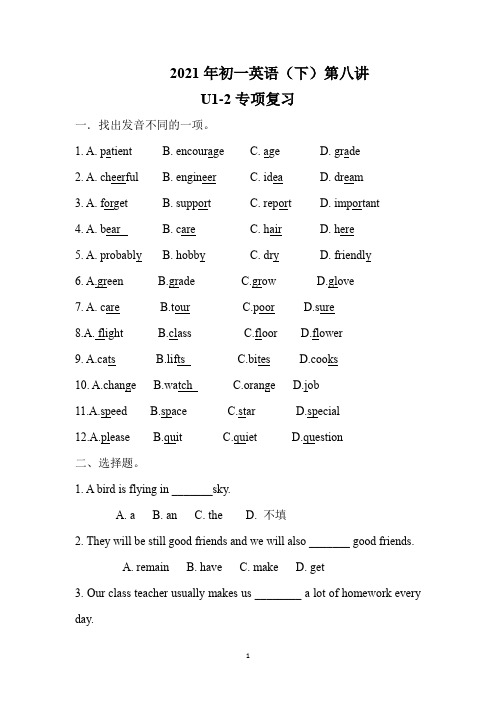
2021年初一英语(下)第八讲U1-2专项复习一.找出发音不同的一项。
1. A. patient B. encourage C. age D. grade2. A. cheerful B. engineer C. idea D. dream3. A. forget B. support C. report D. important4. A. bear B. care C. hair D. here5. A. probably B. hobby C. dry D. friendly6. A.green B.grade C.grow D.glove7. A. care B.tour C.poor D.sure8.A. flight B.class C.floor D.flower9. A.cats B.lifts C.bites D.cooks10. A.change B.watch C.orange D.job11.A.speed B.space C.star D.special12.A.please B.quit C.quiet D.question二、选择题。
1. A bird is flying in _______sky.A. aB. anC. theD. 不填2. They will be still good friends and we will also _______ good friends.A. remainB. haveC. makeD. get3. Our class teacher usually makes us ________ a lot of homework every day.A. to doB. doingC. doesD. do4.Nobody could solve this difficult problem alone________ others’ help.A.withB.forC.withoutD.from5.-Sam, don’t forget______ the book to the library tomorrow.-OK, I won’t.A.returnB.returningC.returnedD.to return6.-Why do you come here?-Because I have ______ to tell you.A.anything importantB.important anythingC.something importantD.important something7.-Mike always______ me to take part in more activities.-He is a good friend.A.encourageB.fightsC.allowsD.allows8.-Jenny, I found_____umbrella. Is it yours?-No,it’s Tom’s. Mine is______ second one on the shelf.A.a;anB.an;theC.the ;aD.a; the9. Miss Wang’s class is always full _____ happiness and activities.A. inB. toC. withD. of10. I know _______ student with a book in his hand.A. aB. anC. theD. 不填11. My grandmother was a short woman ________ grey hair.A. ofB. withC. inD. about12. She is good at playing ______violin.A. aB. anC. theD.不填13. These children are very lovely. They are _______ quite kind to others.A. alsoB. tooC. as wellD. either14. Try to remember the new words. Don’t ________ them.A. leaveB. forgetC. haveD. get15. Uncle Wu is good at ________ to make fun.A. making jokesB. tell jokesC. telling jokesD. made jokes16. He likes playing ________ basketball.A. aB. anC. theD. 不填17. Most of our classmates wear ________________ when they have classes.A.a pair of glassB. a glassesC. a pair of glassesD. a glass18.We have_____lunch in ____middle of_____ day.A./;a;/B.the;/;anC.A; the;/D./;the;the19. You can buy MP4 ______you like listening to music.A. andB. ifC. WhenD. after20. Our teacher always _________ us _________ speak English in class.A. encourage, toB. encourages, toC. encourage, withD. encourages, with( ) 21. Work hard _______ you will finally find the answer to the problem.A.andB. butC. orD. so22. It is silly ______you to do it like this.A. forB. ofC. toD. with23. He _________living in the country to the city.A. likesB. prefersC. enjoysD. loves24. How about going to Hang Kong? It has ______for everyoneA . everything B. something C. anything D. nothing25.There are so many steps to the top floor. You can ____the lift.A. getB. bringC. carryD. take26. Last night I went to bed late, _____I am really tired now.A. soB. orC. butD. because27. He is rich, __________he isn’ t happy .A. butB. andC. orD. so28. The old man can’t read ________write.A. andB. orC. butD. so29. The school library is _______to students every day, so you can read there.A. closeB. closedC. openD. opened30. I spend_____ hour playing______ drums every day.A.a;theB./;theC.an;theD.an;an31. He prefers______to in my spare time.A.to read;watching TVB.to read;watch TVC.reading;watch TVD.reading;watching TV32.Stephen Hawking was famous_____ a scientist, he made a great contribution to the world, and he died____ March 14th, 2018.A.for;onB.for;inC.as;inD.as;on33.Mrs Zhao went _____ after she finished____her work last Monday.A.shop;doingB.shopping;doingC.shopping;toD.shop;to do34.The number of the workers______over 500 in my factory.A.isB.areC.beD.was35.-It takes me half an hour_____playing the piano. How about you?-I usually spend 30 minutes_______ it.A.practising;onB.to practise;inB.practises;in D.to practise;on36.Why not_____ to Beijing this year? It is famous _____ many places of interest.A.to go;ofB.go;forC.to go;forD.go;as三、完成句子。
沪教牛津版英语七年级下册Unit1学习要点汇总
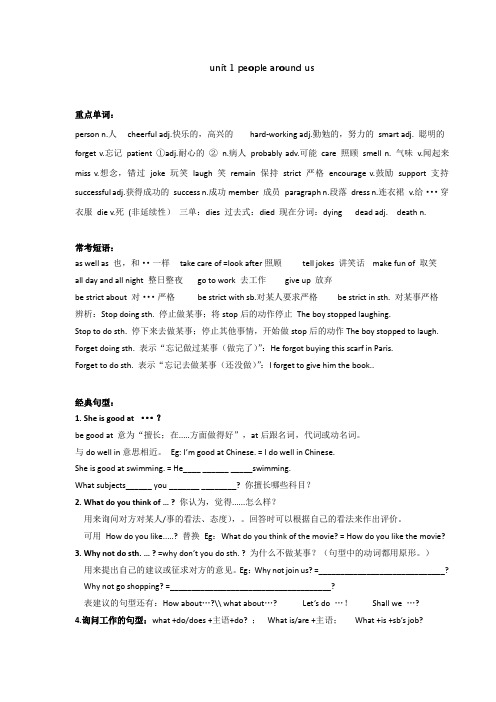
unit 1 people around us重点单词:person n.人cheerful adj.快乐的,高兴的hard-working adj.勤勉的,努力的smart adj. 聪明的forget v.忘记patient ①adj.耐心的②n.病人probably adv.可能care 照顾smell n. 气味v.闻起来miss v.想念,错过joke 玩笑laugh 笑remain 保持strict 严格encourage v.鼓励support 支持successful adj.获得成功的success n.成功member 成员paragraph n.段落dress n.连衣裙v.给···穿衣服die v.死(非延续性)三单:dies 过去式:died 现在分词:dying dead adj. death n.常考短语:as well as 也,和··一样take care of =look after照顾tell jokes 讲笑话make fun of 取笑all day and all night 整日整夜go to work 去工作give up 放弃be strict about 对···严格be strict with sb.对某人要求严格be strict in sth. 对某事严格辨析:Stop doing sth. 停止做某事;将stop后的动作停止The boy stopped laughing.Stop to do sth. 停下来去做某事;停止其他事情,开始做stop后的动作The boy stopped to laugh. Forget doing sth. 表示“忘记做过某事(做完了)”:He forgot buying this scarf in Paris.Forget to do sth. 表示“忘记去做某事(还没做)”:I forget to give him the book..经典句型:1. She is good at ···?be good at 意为“擅长;在.....方面做得好”,at后跟名词,代词或动名词。
上海教育出版社七年级下册下unit1重点句子分析

上海教育出版社七年级下册下unit1重点句子分析课文重点句子的讲解1、She takes time to help her child.她花时间帮助她的孩子。
(1)take time意为“花时间”,后接动词不定式。
take time to do sthEg:Take time to check your answers before you hand in your test paper, please.四花费(spend, pay, cost, take)的用法:人+spend (spent) +时间/金钱+ on sth./ (in) doing sth.人+pay(paid) +钱+for+物物+cost (cost) +sb. +金钱It takes (took) sb. some time to do sth.如:I spent 200 yuan on the bag.= I paid 200 yuan for the bag.= I bought the bag for 200 yuan(2)help sb. (to) do sth.帮助某人做某事= help sb. with sth.在某方面帮助某人Li Ping helps me learn English. = Li Ping helps me with my English.help oneself (to) 请自便;请随便吃with the help of= with one?s help在某人的帮助下can?t/ couldn?t help doing sth. 忍不住……,禁不住……2. my grandma was a short woman with hair.with 介词“带有”表伴随状态、特征。
后面跟名词、动名词(动词-ing)反义词:without“没有”3. She was always cheerful.形容词的用法:形容词修饰名词,放在名词的前面;修饰be动词、系动词(get, become, appear等)构成系表结构放在be动词的后面;修饰感官动词(look,smell,taste, sound, feel)放在感官动词的后面a good cook look beautiful4、I will never forget the taste, and the smell as well. 我将永远不会忘记那种味道和气味。
- 1、下载文档前请自行甄别文档内容的完整性,平台不提供额外的编辑、内容补充、找答案等附加服务。
- 2、"仅部分预览"的文档,不可在线预览部分如存在完整性等问题,可反馈申请退款(可完整预览的文档不适用该条件!)。
- 3、如文档侵犯您的权益,请联系客服反馈,我们会尽快为您处理(人工客服工作时间:9:00-18:30)。
-4–
致易教育英语教研组
中小学课外辅导专家
one of the most beautiful countries 最美丽的国家之一 on of the biggest animals 最大的动物之一 6. between…and… 在……和……之间,可用于表示位置和时间关系。 There are many bridges and tunnels between Pudong and Puxi. He’ll free between five o’clock and six o’clock. 7. surprising adj.令人惊奇的; surprised adj. 感到惊奇的; surprise v. 使吃惊;使感到意外,n. 惊奇 It is not surprising that many tourists come to visit Shanghai every year to shop. I was very surprised to see him here. The news surprised us all. to one’s surprise What a big surprise he gave us! 8. in about eight minutes 在大约八分钟内 “in+一段时间”的结构有以下两种含义: (1)表示“在一段时间之内”,常用一般现在时或过去时。
一、填入适当的词完成下列感叹句。 1).________ difficult homework we had yesterday! 2).________cute dog it is! 3).________ interesting the story is! 4).________ bad the weather in England is! 5).________ honest boy Tom is ! 6).________ good time we had on the beach yesterday! 7).________ exciting news you've brought us! 二、所给句子填空,使填空句变为相应的感叹句: 1. The boy swam very fast. _______ _______ the boy swam! 2. Hei Long jiang looks very beautiful in winter. _______ _______ Hei Long jiang looks in winter!
A. How
B. What
C. What a
( )16. ________ slowly Tom runs!
A. How B. What
C. What a
( )17._____lovely the snow looks!
A. What B. How
C. What a
( )18.________useful information it is!
How careful she is!
How fast he runs!
-1–
致易教育英语教研组
中小学课外辅导专家
2. 句型:“ How +形容词+ a/an +可数名词单数+主语+谓语!”。
How beautiful a girl she is! 3. 句型:“ How +主语+谓语!”。
How time flies! 光阴似箭! 三、感叹句在表示激动强烈的感情时,口语中常常采用省略句。
How good the boy is! 这男孩多好啊! 注意:若出现副词或是句子,直接用 how.
How well he plays the guitar!
How fast Liu Xiang runs 感叹句往后看 形容词后是名单 形后若是不可数或名复数 形容词后乱糟糟
就用 what a 或 what an 只用 what 就可以 只写 how 就 OK 了
C. What well
( )3._______quiet the park is!
A. What a
B. How C. How a
( )4._____his father works!
A. How careful
B. How carefully
C. What careful
( )5.______delicious soup!
( )13.____surprising news it is!A. HowB Nhomakorabea What
C. What a
( )14.____time we’re having today!
A. What a good B. How good C. What good
( )15.Look! ______beautiful that lake is!
5.He is too yellow to stand up and fight.
6.They felt very blue after the failure in the football match.
感叹句通常由 what 或 how 引导。"what"和"how"与所修饰的词置于句首,其它部分用陈述 句语序。 一、 由"what"引导的感叹句: 1. 句型:“ What + a/an +形容词+可数名词单数+主语+谓语!”。
________ ________ the students are listening! 三、选择填空。
( )1._______a clever boy he is !
A. What
B. How
C. What’s
( )2._______she dances!
A. How good
B. How well
-2–
致易教育英语教研组
3. It is a very useful dictionary.
_______ _______ _______ dictionary it is!
_______ _______ _______ dictionary is!
4. The students are listening very carefully.
①What an honest boy! ②What red apples! ③How cool! ④How wonderful!! 有时感叹句也可以由一个单词、词组、祈使句、陈述句等构成。
Good idea!
wonderful!
Thank goodness! 总结:感叹句巧解:感叹句要看形容词后的词语
致易教育个性化辅导教案
中小学课外辅导专家
学生编号
7NJ
学生姓名
授课教师
辅导学科 七年级英语
教材版本
沪教版
授课时间
课题名称 期中考试复习 UI--2
课时数
教学目标 掌握 U1.2 重点词组和句型
重点难点
1. 感叹句的改写方法 2. 重点句型的运用
1.a white lie 2.white man 3.black in the face 4.a yellow dog
A.What an B. How
C. What
-3–
中小学课外辅导专家 致易教育英语教研组
中小学课外辅导专家
Unit 1 Writing a travel guide
一.词性转换 tour (v) –tourist (n) suggest (v .)—suggestion (n .) make suggestions decide ( v.) –decision (n .) design (v .) – designer (n .) sightsee (v .)—sightseeing (n .) surprise (v .) ---surprising (adj.)——surprised(adj) nation ---national (民族的)---international (国际的) float (v .)—floating (adj.) 二.重点短语 1.take part in, join in, join 区别
a.take part in take part in 意为“参加,参与(事物或活动: meeting, conference, conversation, war 等)”。 Switzerland didn't take part in this war. How many countries will take part in the World Cup? b.join in join in sth. / doing sth.意为“参加”,后面接的宾语一般是表示竞赛、娱乐、游戏等活动的名词或 V-ing。 Can I join in the game? They all join in singing the song. c.join join 意为“参加(某组织),加入(某处任职),参加到某个人群中去,从而成为其中一员”。 She joined a health club. We both joined the Labor Party. 2. get on with 进展 How are you getting on with your project? 你们的项目进展如何? get on with 相当于 get along with 还可以表示“与……相处”的意思。 How are you getting on with you new classmates? get on well with sb.“与……相处融洽” Does he get on well with his cousins?他和他的表兄弟们相处得好吗? 3. be famous for 介词 for 表示原因。 Shanghai is famous for its night views. Hangzhou is famous for the West Lake. 4.be known as 介词 as 表示“作为……”。 Shanghai is known as a “Shopping Paradise”. Venice is known as the City of Water. 5.one of the largest cities one of+形容词最高级+名词复数,表示“最……之一” one of the greatest inventors 最伟大的发明家之一
